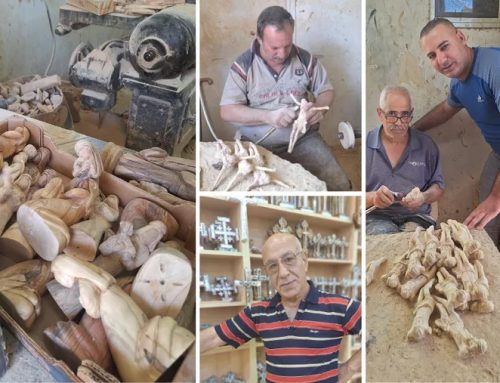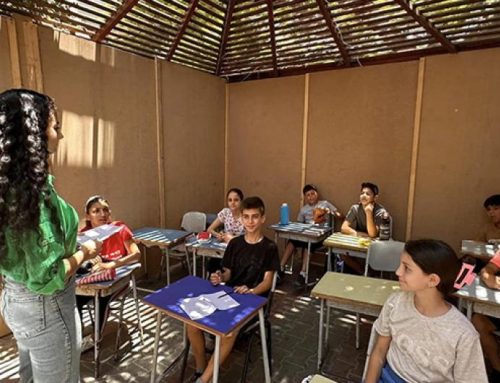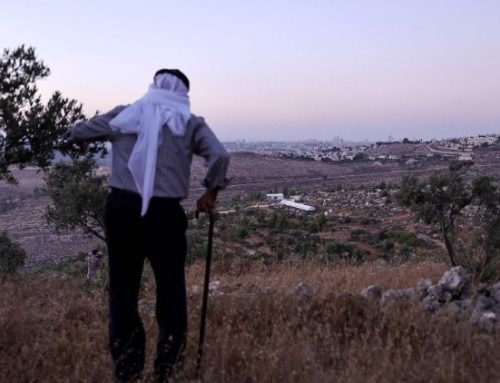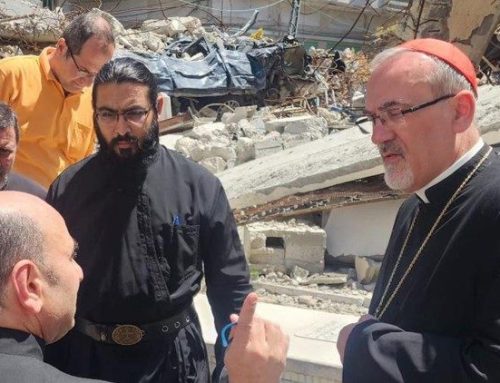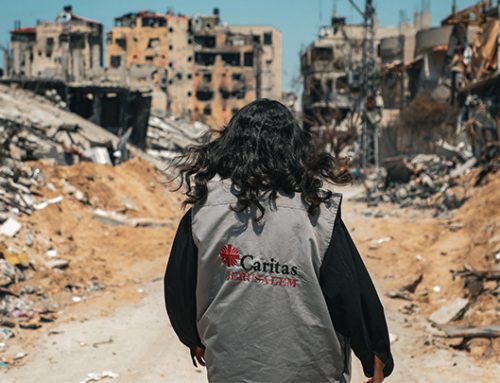Coadjutor Patriarch of Jerusalem on his first visit to Ireland highlights role for Christian community in negotiating peace in the Holy Land
‘Only a just and lasting peace with the Palestinians will offer security to Israel.’ – Archbishop Seán Brady, Catholic Primate of All-Ireland
‘It is time to intensify action, particularly through negotiation, to end the occupation and to establish an independent Palestinian State.’ – Archbishop Fouad Twal, Coadjutor Patriarch of Jerusalem
Archbishop Seán Brady today welcomed Archbishop Fouad Twal to Ireland on his first official visit since becoming Coadjutor Patriarch of Jerusalem.
Opening a Mass to celebrate the investiture of new members of the Equestrian Order of the Holy Sepulchre, an ancient Order of the Catholic Church which undertakes charitable works in support of Christian sites in the Holy Land, Archbishop Brady addressed the current plight of the Christian community in the Holy Land and the need for a new initiative to establish a just peace between Israel and the Palestinians:
“It is very sad to see so many Christians leave the Holy Land. What a shame to hear Bethlehem, so dear to Christians, now described as a vanishing Christian community, an isolated town, with boarded up shops and surrounded on three sides by an eight metre high concrete wall. I believe the Christian presence in the Holy Land is a moderating influence and is essential to achieving peace.”
Renewing the call for both Jewish and Palestinian leaders to continue to work towards bringing all the interested parties to the negotiating table, Archbishop Brady continued: “The future of all peoples of the Holy Land depends on the securing of a just and lasting peace. Only a just and lasting peace with the Palestinians will offer security to Israel. Only a just peace will set Israel free from its present anxiety. That just peace will only be found if and when the needs of the weak are given priority over the wishes of the powerful and both sides begin to hear each others voices and to recognise each others rights.”
Later, addressing over one hundred members of the Equestrian Order of the Holy Sepulchre gathered for the event, the Coadjutor Patriarch of Jerusalem, Archbishop Twal, made a heartfelt appeal for negotiations between Israelis and Palestinians ‘mediated by an impartial party’ and an end to ‘threats and violence from both sides’.
Commenting on the vital role which can be played by the Christian community in resolving the conflict, Archbishop Twal commented:
‘Peace is directly related to God who in himself is the fullness of love. He sent his Word and only Son to gather into one the dispersed sons of God and to destroy the wall which separates them. (cf. Jn 11:52). Peace is also a task God has entrusted to us as a good to be continually sought and defended. Peace is never achieved once and for all; it must be worked for constantly.’
‘Only a return to the negotiating table on an equal footing, with due respect for international law, is capable of disclosing a future of brotherhood and peace for those who live in this blessed land. All individuals
Archbishop Twal continued: ‘In fact, negotiations are the most civilised means in seeking justice. The negotiations we need require real dialogue, mediated by an impartial party to the conflict. An agreement should not be made under threat – it will not be effective. And this is, unfortunately, what we see – threats and violence from both sides. Working towards a negotiated agreement would result in great benefits for the Israelis, in terms of security, and acceptance within the Arab and Muslim worlds. Peace and justice are reciprocal. Until now Israel won almost all the wars with the Arabs; until now Israel never won peace and security, because it relies only on its military power, rather than on international rules and resolutions.’
Commenting on the ongoing sufferings of the small Christian community in the Holy Land and their continuing Exodus from the area as a result of the ongoing conflict, Archbishop Twal made an emotional plea for Irish Christians to offer their solidarity and support:
In front of this painful suffering, we raise our voices to say "Enough":
• Enough to the Occupation and the suffering of human beings;
• Enough to killing and to unchecked violence;
• Enough to the lack of security and stability;
• Enough to the violations of the human rights and dignity of all men and women, whoever they may be;
• Enough to the logic of violence. It is time to stand in front of God, who is the Father of all, and the judge of all, in order to change our ways and return to Him. When we go back to God, we go back to our fellow brothers and sisters. The love of God can not be separated from loving men and women and defending their dignity by calling them to justice and reconciliation, in order that all may live in dignity and stability.
We want our children to be secure; we want our young people to find a bright future in this country; we want all fathers and mothers to be able to provide a quality life for their children; we want our present generation to build a better future in this land:
• a future where everyone can live in dignity, justice and mutual trust;
• a future where no man can do injustice to his fellow brothers and sisters;
• a future where no people controls another one;
• a future where all rights are protected.
Expressing his gratitude to the Irish Lieutenancy of the Order of the Holy Sepulchre for their ongoing support and to Irish aid agencies such as Trócaire, Archbishop Twal concluded:
‘Our vocation is to remain, despite our small number, in the Land, where Jesus preached, redeemed humanity and founded the Church. Together with your support, we will continue to stay and to keep our Faith. Our Mission is to be witnesses of the Gospel of love and reconciliation, being a bridge amidst a Moslem and Jewish majority.’

